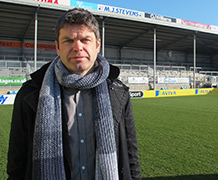Articles

Professor Huw Williams is leading the international interdisciplinary project aimed at managing the impact of injuries following head trauma
Tackling concussion with Exeter Chiefs
Specialists from the University of Exeter are working with Exeter Chiefs Rugby Club on a project to model what happens to the brain of a player when they are concussed in order to improve safety and manage the impact of injuries following head trauma.
The data gathered during the research and the resulting findings could have a huge impact on the prevention and management of injury across a wide range of fields. Traumatic Brain Injury (TBI) is the biggest cause of death and disability worldwide in young children and working age adults.
Professor Huw Williams, Co-Director of the Centre for Clinical Neuropsychology Research at the University of Exeter, who is leading the project, said: “At present it is still the case that there is little evidence base for the management of Traumatic Brain Injury (TBI). There is a need to develop better systems for understanding and treating TBI, particularly in the acute period, straight after a knock out, before there may be irreversible changes in brain tissue. We are delighted to be embarking on this project with Exeter Chiefs, who clearly place the safety of their players at the forefront of what they do.”
Rob Baxter, Head Coach at Exeter Chiefs said: "Concussion is an issue in rugby, like any contact sport. We take it seriously at the Chiefs and we're always looking for ways in which we can look after our players. This is a great opportunity for us to work with bio-engineers, neuropsychologists and medics to better understand concussion and how we can help our players recover to get back in the game and, most importantly, stay healthy."
The work with Exeter Chiefs is part of a wider project which will model how the brain reacts to trauma in car and sports incidents. The team at the University of Exeter will share data with colleagues in China (Tsinghua University, Beijing), The USA (University of Virginia) and Glasgow University to determine possible safety measures and for early brain trauma management and intervention strategies.
Adrian Harris, Head of Sports Medicine at Exeter Chiefs and Consultant Emergency Physician at the Royal Devon and Exeter NHS Foundation Trust, added: “Safety and welfare is paramount to all the Chiefs doctors and physiotherapists. Whilst we have an excellent understanding of the best management of a player with a major traumatic brain injury, we do not currently have the same level of understanding for players with more minor injury. Consequently we adopt an extremely cautious approach in the way we manage all minor traumatic brain injuries. This project offers an important opportunity to refine our knowledge of how to ensure players stay safe, recover effectively and return to the game they love.”
The researchers will carry out a systematic review of the current state of knowledge of bio-mechanical models of head injury across neuro-developmental stages into adulthood. This will allow them to understand how the brain reacts to acceleration and deceleration injury in ‘fast stop’ events like car crashes and rugby tackles, how impact to the head leads to changes in the brain immediately as the trauma is happening and how the changes can be linked to neuropsychiatric and cognitive problems for survivors.
Another project member will be Simpleware, a spin-out company from the University of Exeter that provides software for turning 3D image data (from sources like MRI and CT) into computer models. Simpleware are providing technical expertise and resources for generating realistic models of the head from scans, which can then be used in other software for simulating impact and the effect of different types of headgear.
Dr Philippe Young, Managing Director of Simpleware and Chair of Computational Mechanics at the University of Exeter, commented: “we’re pleased to contribute to this project. The head model research carried out at the University and Simpleware has great potential for understanding the mechanics of head injury.”
The team have already worked with Exeter Chiefs Rugby Club to collect neuro-imaging data on players before and after they were concussed, and on their neuro-cognitive functions. The Chiefs also video capture any head injuries sustained in tackles, meaning various types of concussion incidents are available for analysis within this project.
Date: 3 March 2015
